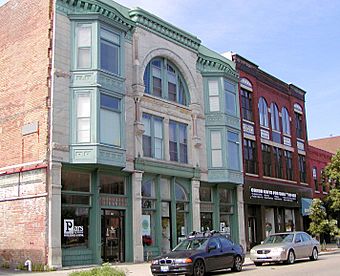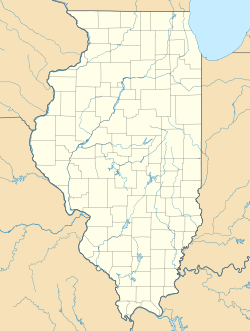Bloomington Central Business District facts for kids
Quick facts for kids |
|
|
Bloomington Central Business District
|
|

Marble company
|
|
| Location | Roughly bounded by Main, Center and Front Sts., Bloomington, Illinois |
|---|---|
| Area | 34 acres (14 ha) |
| Built | Various |
| NRHP reference No. | 85000363 |
| Added to NRHP | February 28, 1985 |
The Bloomington Central Business District is a special part of downtown Bloomington, Illinois. It's known as a historic district because it has many old buildings. These buildings show what the city was like a long time ago.
This area covers about twelve city blocks. It includes 140 buildings in total. Out of these, 118 buildings are "contributing buildings." This means they help tell the story of the district's past.
Contents
Exploring Bloomington's Historic Center
The heart of this historic district is the McLean County Courthouse. This important building was finished in 1901. It serves as the main government building for McLean County.
Buildings from the Past
Most of the other buildings in the district were built between 1842 and 1942. They were mainly used for businesses and shops.
Early Days of Bloomington
Some of the oldest buildings are the Miller-Davis Law Buildings. They were built way back in 1843. These buildings show us how Bloomington started to grow.
A City on the Rise
Bloomington's business area grew very fast in the 1850s and 1860s. This happened after two railroads came to the city. The Gridley Bank, built in 1854, is the only building left from before 1857. But many other buildings from later in this busy time are still standing.
The city kept growing from 1860 until 1900. Its business district also got bigger.
Rebuilding After a Fire
However, a big fire in 1900 destroyed much of downtown Bloomington. Many buildings in the district today were built right after this fire. They show how the city rebuilt itself in the early 1900s.
A Recognized Historic Place
The Bloomington Central Business District was officially added to the National Register of Historic Places on February 28, 1985. This means it's recognized as an important historical area.


